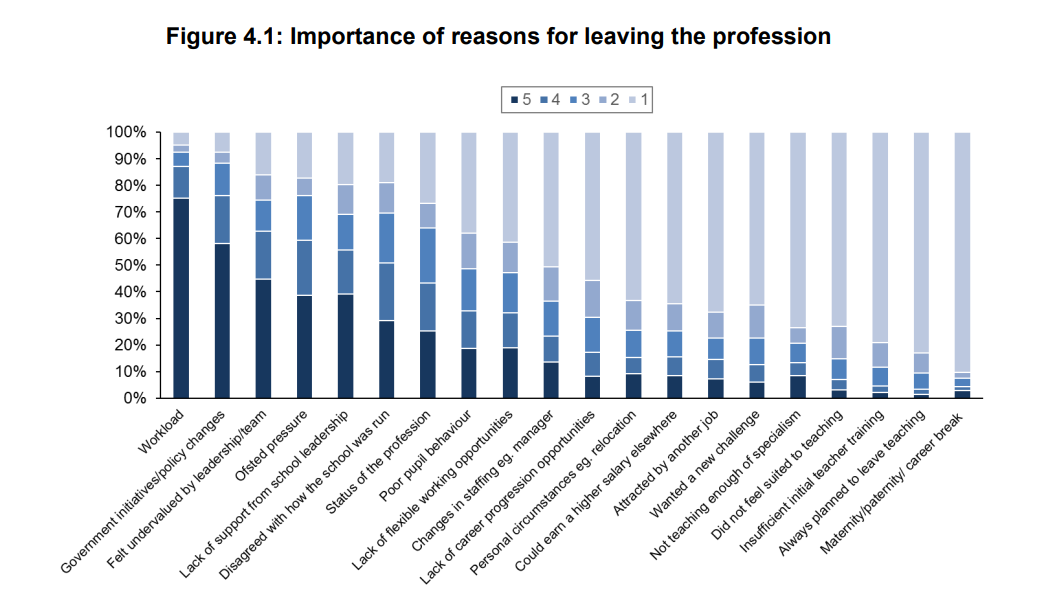Workload is the “most important factor” for teachers leaving the profession, with government initiatives and policy changes not far behind, research by the Department for Education has found.
The government has published a wide-ranging analysis of teacher supply, which looks into problems at school and teacher level.
As part of the research, the DfE surveyed 1,023 ex-teachers who have left since 2015, and 75 per cent said workload was the reason they left the profession.
Other important factors included government initiatives and policy changes, feeling undervalued by school leaders, Ofsted pressure and lack of support from leadership.
The research also found a correlation between the Ofsted rating of a school and the proportion of teachers quoting issues such as feeling undervalued or unsupported by leadership, Ofsted inspection pressure, disagreeing with how schools are run and poor pupil behaviour as important factors in their departure.
Only 17.1 per cent of respondents said the idea of earning a higher salary elsewhere was a “major factor” in their decision to leave.
In fact, more than half of teachers left for a job that actually paid less than their teaching role. Just one quarter said they went on to earn more.
More than 60 per cent of leavers remained in education, but the destinations of those who did not were “hugely varied”, the report said.
Low pay and a lack of career progression opportunities were higher on the priority list for teachers aged between 20 and 30 than for their older counterparts, the research also found.
Workload, pupil behaviour, Ofsted pressure, and flexible working were also higher factors for younger teachers.
The research has been published just one day after the National Audit Office launched a damning new report on teacher supply issues.
The report found half of school leaders have not engaged with the government’s flagship ‘workload challenge’ programme at all, and that only £91,000 has been spent on programmes to support workload or pupil behaviour.









This should be read in conjunction with Freddie’s article yesterday summarising the National Audit Office’s damning report about teacher recruitment and retention. http://schoolsweek.co.uk/dfe-cant-prove-teacher-recruitment-and-retention-efforts-are-working/
Nick Gibb was accused of complacency in the Commons’ debate on teacher shortages on 11 September 2017. He gave a glib answer about there being more teachers in school than when Labour was in office (Note to schools minister: the rise in number of teachers is caused by rise in number of pupils but there are still serious problems with teacher recruitment and retention. These issues were described by the NAO as ‘issues that the Department needs to address urgently.’)
I think if there’s any good news in this it’s that the major factors affecting retention are around management and leadership in schools rather than the attraction of external jobs or classroom behaviour. If management and leadership acknowledge the problem and the systematic weaknesses in many schools around retention and get the training and advice needed retention can improve!
I would still be teaching if it hadn’t been for the management bullying me out after I became disabled.
Apparently having a Maths degree was less important than the fact that I needed to use a wheelchair- apparently I wouldn’t be able to have enough physical presence to be an effective classroom teacher!
I fought really hard for three years but there wasn’t a week that went past without some incident of discrimination and harassment.
After 15 years of teaching at the same school and 17 years of teaching, I was driven to a complete breakdown and then sacked. In that three years there had been a year and a half of times when they had refused to allow me to work at all and I had been isolated at home while trying to battle them, via my union, to allow me back and when they did let me back they made conditions so impossible that they made my mental health collapse and my physical condition deteriorate sharply.
All I have to show for 17 years of mainly successful teaching is a shelf full of legal files of the emails and letters and Gigabytes of voice recordings that prove that discrimination. Two years after losing my job, I am still suffering from severe PTSD and can’t even get close to a school building without severe flashbacks and going to pieces.
Freddie, can you link to the report, or indicate its title or authors? Thanks